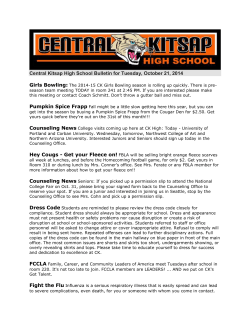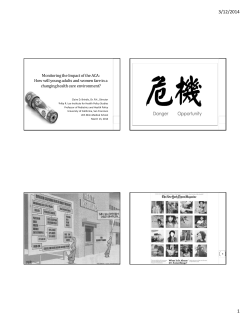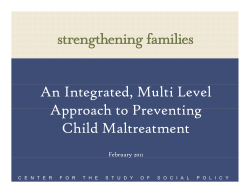
Career Counseling Strategies and Techniques for the 21st Century Chapter 8
Career Counseling Strategies and Techniques for the 21st Century Chapter 8 Career Development Interventions • Career development interventions provide the historical foundation for the counseling profession (Dorn). • The counseling field emerged from three distinct movements (Herr & Cramer): – vocational/career guidance – psychological measurement – personality development Career Interventions, continued • We know relatively little about the career counseling process (Niles & Anderson). • Career counselors rarely study how career counseling actually works. What Do We Know? • There is a positive relationship between counselor confidence in establishing a therapeutic relationship and client confidence in coping with career transitions. • Career counseling clients devote considerable attention to noncareer concerns in sessions. What We Know • Career counselors tend to give information and set limits more frequently during career counseling than during general counseling. • Career counseling participants identify aspects of self-exploration, support, and educating as the most important and helpful career counseling interventions. What We Know • There seems to be a close relationship between the processes of psychotherapy and career counseling. • Developing an effective working alliance is critical to positive outcomes in career counseling. Expanding the Limited View of Career Counseling • Students often conclude that career counseling is a sequence of interventions that resembles the following: – Step 1: Client presents for career counseling. – Step 2: Counselor gathers client information and administers a test battery. – Step 3: Counselor interprets tests and identifies a few appropriate occupational options for the client. Characteristics of This Approach • Counselor is in charge of the process. • Counselor is directive and authoritative. • Clients are passive recipients of a predetermined test battery. • Career counseling becomes something that is done to clients rather than something the counselor and client participate in collaboratively. Career Counseling and Mental Health Counseling (Niles & Pate) • Given the relationship between work and mental health, it is perplexing that there has been an artificial distinction between career counseling and mental health counseling. • Career counseling and personal counseling are often referred to as if they were completely separate entities. • In fact, there are few things more personal than a career choice. Career Counseling in the 21st Century (CACREP) • Career counseling is both a counseling specialty and • a core element of the general practice of counseling. Crites’ View • The need for career counseling is greater than the need for psychotherapy. • Career counseling – – – – can be therapeutic. should follow psychotherapy. is more effective than psychotherapy. is more difficult than psychotherapy. Definition of Career Counseling (Brown and Brooks) • Career counseling is an interpersonal process designed to assist individuals with career development problems. Designing Career Counseling Strategies for the 21st Century • Career counselors must respond to – – – – global unemployment corporate downsizing jobless economy global competition of small companies via information highway – workerless factories Designing Career Counseling Strategies for the 21st Century, continued – redefinition of social contract between employers and employees – increase in the number of companies offering daycare and parental leave – increase in the number of families with dual incomes – increase in the number of people working from home Requirements of Today’s Workplace • Using computer technology • Engaging in lifelong learning • Interacting effectively with diverse coworkers • Tolerating ambiguity in job security • Being vigilant about maintaining a high level of self and occupational awareness to maintain marketability Characteristics of Career Development Interventions That Foster SelfAffirmation • • • • Provide counseling-based career assistance Provide support to their clients Attend to their clients’ life structure issues Empower clients to clarify their selfconcepts and construct their own lives • Exhibit understanding that every counseling relationship is cross-cultural Classifying Forms of Client Resistance • • • • Response quantity resistance Response content resistance Response style resistance Logistic management resistance Types of Support • Emotional support • Informational support • Assessment support Skills for Working with Resistant Clients • • • • • • • • • Using presuppositions Using embedded questions and directives Correcting transformational errors Labeling and reframing Recognizing and dealing with resistance Identifying irrational beliefs Identifying distorted thinking Using reflective judgment stages Focusing on excuses Savickas’ Career Style Assessment • Identify life themes (early experiences, role models, books, movies, etc.). • Turn life themes into career goals. Types of Clients Who Benefit from Subjective Interventions • Indecisive clients • “Difficult cases” or clients who have received but not profited from counseling • Mid-career changers • Culturally diverse clients Strengths of Subjective Assessments • Help clients understand themselves at a deep level • Help clients consider the relevance of their life experiences to their career development • Help clients attach a sense of purpose to their activities • Are inexpensive to use • Actively engage clients in the counseling process • Results are clearly connected to client responses Strengths of Objective Assessments • Allow client to make comparisons with others • Are outcome-oriented • Do not require as much counselor time as subjective assessments • Provide a useful starting point for subsequent consideration of career options A Framework for Career Counseling • Getting started • Helping clients deal with change • Helping clients engage in self-assessment activities • Helping clients learn more about the world of work • Helping clients expand or narrow choices • Helping clients make plans Phases of the Career Counseling Process (Gysbers, Heppner, & Johnston) • • • • Opening phase Phase of information-gathering Working phase Final phase Phases of the Career Counseling Process (Niles & Harris-Bowlsbey) • Beginning or Initial Phase – establish effective relationship – begin to gather information about the client – define preliminary goals for counseling • Middle or Working Phase – explore concerns and goals in depth – develop and implement a specific plan of action Phases of the Career Counseling Process (Niles & Harris-Bowlsbey), continued • Ending or Termination Phase – Connect the work done in the beginning and middle phases by assessing client’s current status – Relate current status to client’s goals for counseling Premature Closure in Career Counseling (Brown & Brooks) • Clients believe they have achieved their goal. • The career counseling experience does not meet the client’s expectations. • Clients fear what might be uncovered in career counseling. • Clients lack commitment to counseling. Questions to Ask About Termination • Did I – review the content of what happened in counseling? – review the process of what happened in counseling? – reemphasize the client’s strengths that were evident in counseling? – evaluate what went well and what went poorly? Questions to Ask About Termination, continued • Did I – explore things unsaid in counseling? – discuss feelings related to the ending of the counseling relationship? – provide clear and direct structure for the client’s next steps? Career Counseling Groups • Group counseling offers a mode of service delivery that can be used instead of, or in addition to, individual counseling. • Hansen and Cramer describe group counseling as an intervention for 5-15 members, with 5-8 members viewed as optimal. Career Counseling Groups, continued • Structured career counseling groups address a specific issue that is a common concern. • Structured career counseling groups typically meet for 3-7 sessions. • Less structured career counseling groups focus on the intrapersonal and interpersonal concerns that clients have about career development. Career Counseling Groups, continued • Less structured career counseling groups tend to be more affective-oriented than structured groups. • Less structured groups meet over a longer period of time than structured groups. Stages in Group Career Counseling (Pyle) • • • • Opening stage Investigation stage Working stage Decision/Operational stage Why Use Career Groups? (Kivlighan) • Members learn new information about themselves and others. • Members receive social and emotional support from other group members. • Members learn from peers who are in similar situations. • Members can share resources and ideas. Criteria for Successful Groups • Members – – – – – – are in open communication with each other. share a common goal. set norms that direct and guide their activities. develop a set of roles to play within the group. develop a network of interpersonal attraction. work toward satisfaction of individual needs.
© Copyright 2025









